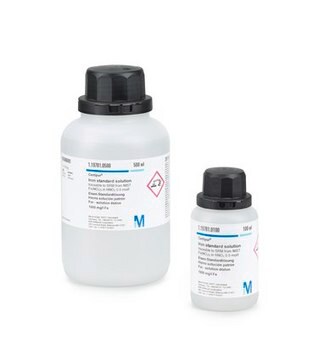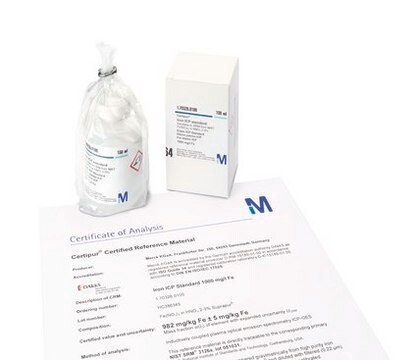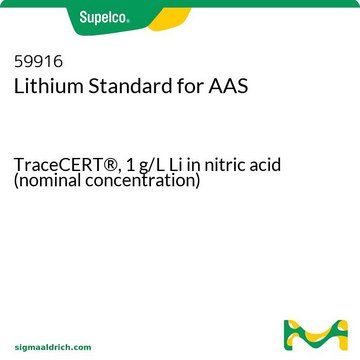18-1630
Lithium standard solution
suitable for atomic absorption spectrometry, 1000 ppm Li, 1 mg/mL Li
Synonym(s):
Lithium chloride solution
Sign Into View Organizational & Contract Pricing
All Photos(1)
About This Item
Linear Formula:
LiCl
CAS Number:
Molecular Weight:
42.39
MDL number:
UNSPSC Code:
12352302
PubChem Substance ID:
form:
liquid
Recommended Products
form
liquid
availability
available only in Japan
concentration
1 mg/mL Li
1000 ppm Li
suitability
suitable for atomic absorption spectrometry
storage temp.
15-25°C
SMILES string
[Li+].[Cl-]
InChI
1S/ClH.Li/h1H;/q;+1/p-1
InChI key
KWGKDLIKAYFUFQ-UHFFFAOYSA-M
Looking for similar products? Visit Product Comparison Guide
Signal Word
Warning
Hazard Statements
Precautionary Statements
Hazard Classifications
Met. Corr. 1
Storage Class Code
8B - Non-combustible corrosive hazardous materials
WGK
nwg
Flash Point(F)
Not applicable
Flash Point(C)
Not applicable
Choose from one of the most recent versions:
Already Own This Product?
Find documentation for the products that you have recently purchased in the Document Library.
Otilia Zarnescu et al.
Micron (Oxford, England : 1993), 46, 66-75 (2013-01-29)
In the present study we examined the effects of lithium chloride on the Corydoras aeneus caudal fin regeneration. After caudal fin amputation, the fish were exposed 3h daily to 35 mM lithium chloride for 9 days. The effects of lithium
Akiva P Novetsky et al.
International journal of gynecological cancer : official journal of the International Gynecological Cancer Society, 23(2), 361-366 (2013-01-09)
Lithium chloride (LiCl) has been shown to demonstrate anticancer properties at supratherapeutic doses. This study was designed to determine whether LiCl, as a single agent or in combination with cytotoxic agents, reduces ovarian cancer cell growth and metabolic activity at
N-C Liang et al.
Neuroscience, 235, 149-158 (2013-02-06)
Stress activates the hypothalamus-pituitary-adrenal (HPA) axis leading to the release of glucocorticoids (GC). Increased activity of the HPA axis and GC exposure has been suggested to facilitate the development of obesity and metabolic syndrome. Nonetheless, different stressors can produce distinct
Servio H Ramirez et al.
PloS one, 8(2), e55972-e55972 (2013-02-19)
Neuroinflammatory conditions often involve dysfunction of the Blood-Brain Barrier (BBB). Therefore, identifying molecular targets that can maintain barrier fidelity is of clinical importance. We have previously reported on the anti-inflammatory effects that glycogen synthase kinase 3β (GSK3β) inhibition has on
Zhuyao Wang et al.
PloS one, 8(1), e55471-e55471 (2013-02-06)
The proliferation and migration of vascular smooth muscle cells (VSMCs) contributes importantly to the development of in-stent restenosis. Lithium has recently been shown to have beneficial effects on the cardiovascular system, but its actions in VSMCs and the direct molecular
Our team of scientists has experience in all areas of research including Life Science, Material Science, Chemical Synthesis, Chromatography, Analytical and many others.
Contact Technical Service






